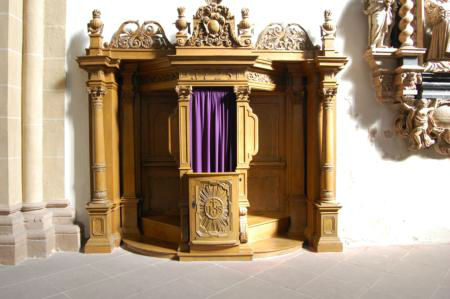We have lost the sense of sin
Pope Pius XII famously once said that "the evil of this civilization" -- our civilization--is "the loss of the sense of sin: we can do anything, we will resolve anything! The power of man is substituted for the glory of God." Pius XII did not say that this loss was one evil, or a significant evil, or a distinctive evil of our times. He said that it was "the" evil.
He also did not say that we lose the sense of sin and that nothing else takes its place. We are not dealing with a phenomenon of pure privation here, but rather with a substitution. One thing goes away, and something else takes its place. God and his glory recede, and we, with a false sense of omnipotence, take his place.
Pope Francis, in one of his morning meditations earlier this year, explained this phenomenon as the substitution of a problem-solving outlook where what was called for was repentance and asking for forgiveness. The Old Testament text for the day was King David's adultery. King David, as you know, who was tempted by the sight of Bethsheba, yields to the temptation--already starting to lose the sense of sin -- and acts decisively to gratify it by taking her for himself. This is bad enough, Pope Francis says, but it is by no means the worst evil described in the passage, which lies in what David does next: "it does not occur to him to ask for forgiveness. He is concerned only with solving the problem ... and David asks himself, 'How can I cover up the act of adultery?'"
As we know from the passage, David tries to induce Uriah, the husband of Bethsheba, to have relations with her, so that David's paternity will be covered up. But this attempt fails, because Uriah is a solid and faithful soldier who refuses to party and to enjoy himself when his fellow soldiers are in harm's way on the field of battle. So David must finally "solve the problem" by telling his captain to arrange for Uriah to be struck down in battle.
Pope Francis points out that when David hears the news of Uriah's death, "he remained calm and continued on with his life." But why should this be so? Why should he be untroubled, when Uriah's death was now an additional wrong, on top of adultery and conceiving a child unjustly? Because David had lost the sense of sin. David "did not turn to God; he did not say, 'Lord, look what I have done: what do we do?' Instead, he assumed a 'worldly' attitude, an omnipotent outlook that says, 'I can do anything!'"
Pope Francis concludes by meditating on "poor Uriah, who paid the bill for the banquet." He was a "martyr to sin," a witness giving testimony to the reality of sin, despite David's loss of the sense of it. There are plenty of present day Uriahs, the pope said, "who pay the bill for the banquet of Christians who are too self-assured, and who, willingly or not, murder their neighbor."
Unborn children killed in abortion are obviously modern Uriahs. So-called "unwanted pregnancy," always the result of someone's sin, is seen as a "problem" which needs to be "fixed"--by medical professionals who do not keep to the limits set down by the Hippocratic Oath and claim a kind of omnipotence for their technique. We so much rely on abortion as a solution to our problems that the Supreme Court (in Casey) cited this reliance as a reason why abortion needed to remain a constitutional "right."
But let us follow Pope Francis' recommendations elsewhere, and the plain sense of Pius XII's warning, and not focus on abortion as the sole problem but consider it, rather, as one of the more grotesque representations of that loss of the sense of sin that is "the" evil of our civilization.
"America, at its best, is a problem-solving nation"-- well, that's what a highly visible, potential presidential candidate recently said. And many politicians would echo it. But is it true? At our best, we are not solving problems. The World War II was not a "problem" and D-Day was not a "solution." The men who died on the beaches of Normandy and Iwo Jima were not "problem solvers." Likewise, when we are merely "solving problems," even honestly, we are not at our best. The Tennessee Valley Authority, admirable and all, is not America at its best; landing a man on the moon, although clever and impressive, does not represent the best which is America.
I submit that we should dissent from this language of "problem solving." It has its place, but its place is restricted. It fails to do justice to our present ills, and it risks soothing us in our complacency about sin.
Our politicians did not always speak thus. Go back and read Lincoln. Our prosperity even in the midst of a Civil War, he said, was "the gracious gift of the Most High God, who, while dealing with us in anger for our sins, hath nevertheless remembered mercy," and he urged Americans "with humble penitence for our national perverseness and disobedience" pray for those who have suffered in the war.
America, at its best, is a nation which turns to God -- which it can do, only if it sees that it has turned away.
Michael Pakaluk is chairman and professor of philosophy at Ave Maria University.
- Michael Pakaluk is Professor of Ethics and Social Philosophy in the Busch School of Business at The Catholic University of America. His book on the gospel of Mark, ‘‘The Memoirs of St. Peter,’’ is available from Regnery Gateway.



















